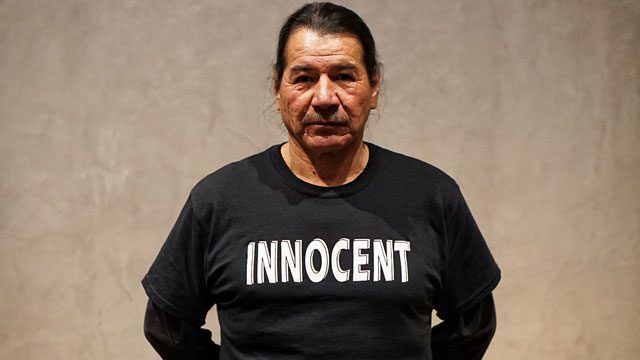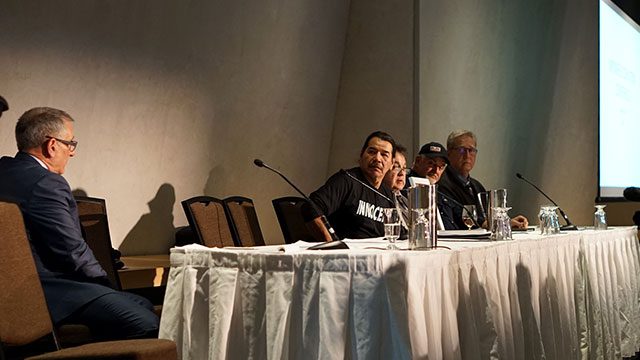
A conference in Winnipeg is dealing with people who are wrongfully convicted and raising awareness about the legal, social and personal costs for them.
One of the speakers was Brian Anderson, 64, from the Pinaymootang First Nation in Manitoba.
Clad in jeans and a black t-shirt with Innocent written across the front, told the conference about his ordeal with the justice system.
“I did everything to fight for my innocence,” Anderson told the packed room at the Human Rights Museum. “Nothing came of it.”
Anderson was incarcerated for a decade after a 1974 murder conviction in the killing of Ting Fong Chan, a chef at the former Beachcomber Restaurant. Two other young, Indigenous men were convicted of murder and a fourth of manslaughter in the case.
He said that Obijway was his first language at the time and that he did not understand the documents he was signing. One of them was a confession.
He was eventually released on parole in 1982 after serving ten years.
“It is not easy to be on parole, you aren’t a free man,” he said. “You need permission to go around, you have a radius, it is like a chain.”
He has now applied to the federal Minister of Justice for a review of his case, the only available avenue for those wrongfully convicted in Canada.
Lawyers at the conference discussed ideas for the establishment of an independent criminal case review commission to “make it easier and faster for potentially wrongfully convicted persons to have their applications reviewed.”

That is something lawyer Greg Rodin, the conference organizer, hopes will change with the creation of the new commission.
Rodin represented David Milgaard and Kyle Unger in their civil claims for compensation in connection with their wrongful convictions and incarcerations.
“We need something that works faster,” he said, “We need to find something that is dedicated to looking after these applications.”
Rodin said that many details including how the commission is formed and who will be on it, need to be worked out.
“All of these things need to be talked about now that the Prime Minister and the Justice minister have embarked on the creation of the board,” he said.
He sympathized with Brian Anderson’s case.
“He is still fighting for exoneration. As he said at the conference, he felt like his life was not worth anything, the world viewed him as the perpetrator of a vicious murder,” he said.
“He felt worthless. He has no real remedy.”
Rodin doesn’t represent Anderson but represented David Milgaard and Kyle Unger in their civil claims for compensation in connection with their wrongful convictions and incarcerations.
According to Rodin, Prime Minister Justin Trudeau tasked Justice Minister David Lametti with the creation of the commission in January 2020.
Rodin could not be reached for comment. Rachel Rappaport, Press Secretary to Justice Minister David Lametti sent an email on behalf of the ministry.
“Our Government is committed to ensuring that effective mechanisms are in place to identify and respond to potential wrongful convictions and address miscarriages of justice. As part of Minister Lametti’s mandate letter, the Prime Minister has tasked him with the establishment of an independent Criminal Case Review Commission to make it easier and faster for potentially wrongfully convicted people to have their applications reviewed. The Minister will be working closely with stakeholders and other implicated actors to determine the path forward on this important commitment.”
Other panelists included Milgaard, James Driskell, Frank Ostrowski and Tom Sophonow.
Between them, the men have spent 73 years in prison.
Anderson said he finds comfort in speaking with the other wrongfully convicted but that it is hard to look to the future.
“When you are behind jail, you don’t think about the future because there is no future,” he said, “There is something wrong here.”
I’m glad a lot of people are here to hear our stories and it is all true.”











So sad to read about your dilemma. These situations cause so much pain for families involved as well. A friend of mine died of cancer while she spent so much time and money trying to prove her son’s innocence. All the more power to Brian Anderson and His family.